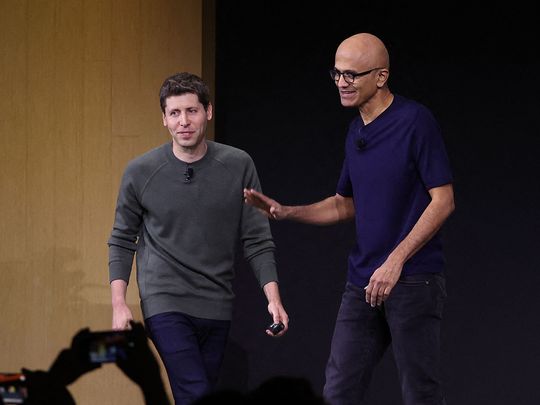“Microsoft Denies Ownership in OpenAI Amid Antitrust Investigation”
As Microsoft navigated a groundbreaking $13 billion investment in OpenAI, regulatory scrutiny loomed large over the unconventional arrangement. Contrary to traditional stakeholding, Microsoft’s investment, designed to secure financial returns without ownership control, is now under the antitrust microscope, leading to global regulatory inquiries.


As Microsoft navigated a groundbreaking $13 billion investment in OpenAI, regulatory scrutiny loomed large over the unconventional arrangement. Contrary to traditional stakeholding, Microsoft’s investment, designed to secure financial returns without ownership control, is now under the antitrust microscope, leading to global regulatory inquiries.
The tech giant’s additional $10 billion investment in OpenAI unveiled an unprecedented arrangement: rather than acquiring a portion of the AI lab, Microsoft structured a deal entitling them to nearly half of OpenAI’s financial returns until a predetermined cap is reached. This unorthodox setup was born due to OpenAI’s status as a capped for-profit entity nested within a non-profit organization, adding complexity to the ownership equation.
However, regulatory bodies, including the UK Competition and Markets Authority and the US Federal Trade Commission, are investigating whether Microsoft’s investment could potentially disrupt competition. Despite Microsoft’s assertion that it doesn’t exercise traditional control over OpenAI due to the unique financial arrangement, regulators are probing the investment’s impact on competition, especially in AI research.
The inquiries, still in preliminary stages, aim to decipher the nature of Microsoft’s influence over OpenAI. While Microsoft contends that its investment doesn’t amount to control under US merger laws, regulators are analyzing the situation, evaluating potential outcomes, and assessing whether the arrangement might breach antitrust statutes.
Acknowledging the scrutiny, a Microsoft spokesperson emphasized the company’s non-ownership status in OpenAI, clarifying that it merely entitles them to profit distributions without governance authority. OpenAI echoed this sentiment, highlighting their independence and competitive operations despite Microsoft’s involvement.
The partnership’s careful positioning to assert independence was challenged recently with the dismissal of OpenAI’s CEO, Sam Altman, prompting significant disruptions within the organization. Despite Microsoft’s lack of direct control, its influential role in reinstating Altman underscores its impact within OpenAI’s decision-making.
As regulatory bodies worldwide closely monitor this unprecedented alliance, concerns linger regarding potential repercussions on competition, Microsoft’s access to sensitive information through a non-voting board observer role, and the possibility of impeding partnerships with rival tech companies.
With European authorities also monitoring the situation and Germany’s competition authority hinting at potential scrutiny if OpenAI expands its operations, Microsoft’s investment in OpenAI continues to be mired in regulatory uncertainty, raising significant antitrust concerns within the tech industry’s competitive landscape.
Sources By Agencies







